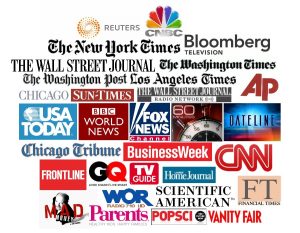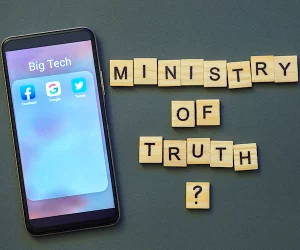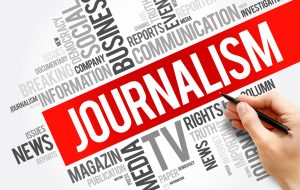As those who follow my blog know, I spent most of my life as a reporter, foreign correspondent, and editor with the Chicago Tribune. After almost 30 years as a professional journalist, I entered academia as a professor of journalism and dean of the College of Media at the University of Illinois. So those are my bona fides.
I figure that kind of background gives me at least a little gravitas when it comes to commenting on the state of journalism today. And if you read my blog posts, you already know that I comment on the state of our news media often and with uninhibited judgment.
There are also times when I turn my blog over to others who have spent time examining the state of American journalism. Today is one of those times. The thoughtful essay that follows appeared recently in the Epoch Times. It is based on a speech by Whitney Webb at the First Annual Children’s Health Defense Conference in October 2022.
I hope you will take a look. Ms. Webb and Mr. Malone make some excellent points.
Journalism in Crisis: The War on Dissent
By Whitney Webb & Robert Malone
Introduction & Background
For years, the censorship of factual information that’s inconvenient to certain powerful actors, including the federal government and Big Pharma, has been steadily increasing as “information warfare” has become an ever-present force in our lives.
In a world where what were once obvious truths are under attack, even the very definitions of “journalist” and “journalism” have themselves become controversial and contested. Too often in this information war, the first casualty is the truth itself.
Facts are rarely treated as sacred by the world’s largest and most influential media outlets but instead are treated as something to be twisted and manipulated for the benefit of their paying sponsors. In this environment, too many media personalities have become mercenaries for hire and, as a consequence, public trust in the media is cratering.
Meanwhile, those who do aim to champion truth in their work are targeted, smeared, and censored by tech companies and platforms aligned with “mercenary media,” unaccountable intelligence services, and out-of-control oligarchs.
The following essay focuses on the ongoing insidious effort to normalize the censorship of factual information, the historical context of this war on dissenting voices, and how “journalism” today has increasingly become about protecting the powerful rather than holding them to account. Potential solutions to this existential crisis in journalism are also discussed.
Journalism in Crisis: The War on Dissent
With each passing day, it seems that journalism is becoming less of a profession and more of a war zone. Indeed the difference between journalism and information warfare is becoming increasingly difficult to pinpoint.
Whereas journalism continues to be defined as “writing characterized by a direct presentation of facts or description of events without an attempt at interpretation,”—in practice, it has become a battlefield where the most powerful media outlets—that is, those closest to the centers of power—deliberately manipulate or omit facts to craft narratives that expressly benefit the powerful while also colluding to censor their more truthful competition.
These media outlets act as mercenaries, with little or no regard for how their actions negatively impact our society and distort reality. Their allegiances lie not with the public but with those with the deepest pockets.
In doing so, in many cases, these media mercenaries actively work to suppress the facts and malign those in journalism who do strive to champion the truth above all else. Instead of holding the powerful to account, many so-called journalists today act more as accessories to the crimes committed by the powerful against the public.
Objective presentation of the facts, as far as the bulk of mainstream media is concerned, is dead and has been dead for some time. As a consequence, public trust in these media outlets has completely cratered. Yet even the ostensible challenge to mainstream media—so-called independent or alternative media—is often troubled by similar issues, as the quest for clicks and fame can often supersede objective, factual reporting, even outside the bounds of mainstream media.

As a result, navigating the world of journalism has never been more difficult or more precarious than it is right now.
But if some get their way, navigating the media landscape in search of truth will soon become impossible. There are major efforts, years in the making, to censor dissenting opinions under the guise of censoring “misinformation.”
As many readers are undoubtedly aware, what was last year’s “misinformation” with respect to COVID-19 injections has only recently undergone a dramatic change into “breaking news.” Yet many of us who were right all along and were censored when factual information that’s now recognized as true was erroneously labeled as “misinformation” have received no apologies or compensation for our lost income. In many cases, our old platforms haven’t been returned to us.
The censorship hammer hasn’t been wielded with incompetence; instead, it has been and is being intentionally used to squeeze out those of us who would dare to speak the truth, no matter how inconvenient it may be at the time.
As the online censorship onslaught continues, it’s becoming increasingly normalized. Growing restrictions, deplatforming, and its other manifestations have become so pervasive that many have simply come to accept it as a “new normal.” This new normal for free speech is as insidious as it has been gradual, as we’re being trained to accept unconstitutional limitations on what we can express on the websites that dominate online socialization.
The argument that’s often deployed to dismiss concerns regarding online censorship is the claim that the dominant social media companies are private, not public, entities. However, in reality, the Big Tech firms that dominate our online lives, particularly Google and Facebook, were either created with some involvement of the U.S. national security state or have become major U.S. government or military contractors over the past two decades.
When it comes to censoring and deplatforming individuals for claims that run counter to government narratives, it should be clear that Google-owned YouTube and other tech platforms owned by contractors to the U.S. military and intelligence communities have a major conflict of interest in their stifling of speech.

The line between “private” Silicon Valley and the public sector has become increasingly blurred, and it’s now a matter of record that these companies have illegally passed information on to intelligence services such as the National Security Agency for use in what are blatantly unconstitutional surveillance programs aimed at American civilians. All indications point to the military-industrial complex having expanded into the military-technology-industrial complex.
These days, one need only look at important government commissions—such as the National Security Commission on Artificial Intelligence, which was headed by former Google/Alphabet CEO Eric Schmidt—to see how this de facto public-private partnership between Silicon Valley and the national security state functions and its outsized role in setting important tech-related policies for both the private and public sectors.
For example, that commission, largely comprised of representatives of the military, intelligence community, and Big Tech, has helped set policy on “countering disinformation” online. More specifically, it has recommended weaponizing artificial intelligence (AI) for the express purpose of identifying online accounts to deplatform and speech to censor, framing this recommendation as essential to U.S. national security as it relates to “information warfare.”
There are already several companies competing to market an AI-powered censorship engine to the national security state, as well as the private sector, for use against journalists and nonjournalists alike.
One of these companies is Primer AI, a “machine intelligence” company that “builds software machines that read and write in English, Russian, and Chinese to automatically unearth trends and patterns across large volumes of data.” The company publicly states that its work “supports the mission of the intelligence community and broader [Department of Defense] by automating reading and research tasks to enhance the speed and quality of decision-making.”
Its current roster of clients includes not just the U.S. military and the U.S. intelligence community but major American companies such as Walmart and private “philanthropic” organizations such as the Bill and Melinda Gates Foundation.
Primer’s founder, Sean Gourley, who previously created AI programs for the military to track insurgents in post-invasion Iraq, asserted in an April 2020 blog post that “computational warfare and disinformation campaigns will become a more serious threat than physical war, and we will have to rethink the weapons we deploy to fight them.”

In that same post, Gourley argued for the creation of a “Manhattan Project for truth” that would create a publicly available Wikipedia-style database built off of “knowledge bases [that] already exist inside many countries’ intelligence agencies for national security purposes.” He wrote that “this effort would be ultimately about building and enhancing our collective intelligence and establishing a baseline for what’s true or not.”
In other words, Gourley says that we should let the CIA tell us what’s true and what’s false. He concludes his blog post by writing that “in 2020, we will begin to weaponize truth.”
And, two years later, it seems that Gourley was right. That’s what they’ve done.
Since that year, Primer has been under contract with the U.S. military to “develop the first-ever machine learning platform to automatically identify and assess suspected disinformation.”
That the term “suspected disinformation” was used is no accident, as many instances of online censorship have involved merely assertions, as opposed to confirmations, that censored speech, including censored journalism, is part of a nation-state-connected or “bad actor”-connected disinformation campaign.
While those campaigns do exist, legitimate, constitutionally protected speech that deviates from the “official” or government-sanctioned narrative is frequently censored under these metrics, often with little to no ability to meaningfully appeal the censor’s decision. In other cases, posts “suspected” of being disinformation or which are flagged as such (sometimes erroneously) by social media algorithms are removed or hidden from public view without the poster’s knowledge.
In addition, “suspected disinformation” can be used to justify the censorship of speech that’s inconvenient for particular governments, corporations, and groups, as there’s no need to have evidence or to present a coherent case that said content is disinformation—one must only cast suspicion upon it in order to have it censored.
Further complicating this issue is the fact that some claims initially labeled as “disinformation” later become accepted fact or recognized as legitimate speech. This has happened on more than one occasion during the COVID-19 crisis, during which journalists had their accounts deleted or their content censored merely for broaching issues such as the lab leak hypothesis and questions over mask and vaccine efficacy, among many other issues.
A year or two later, much of this supposed “disinformation” has since become acknowledged as a legitimate avenue of journalistic inquiry. The initial bout of blanket censorship on these topics was done at the behest of public and private actors alike due to their inconvenience to what had once been the prevailing narrative.
In what appears to be the apparent fulfillment of Primer AI’s pleas, the Biden administration has recently announced a push to “increase digital literacy” among the American public while also censoring “harmful content” disseminated by so-called domestic terrorists, as well as by “hostile foreign powers seeking to undermine American democracy.” The latter is a clear reference to the claim that critical reporting of U.S. government policy, particularly its military and intelligence activities abroad, is synonymous with “Russian disinformation,” a now-discredited claim that has been used to heavily censor independent media.
Regarding “increasing digital literacy,” the policy documents from the Biden administration make it clear that this refers to a new “digital literacy” education curriculum that’s currently being developed by the Department of Homeland Security, the domestically focused U.S. intelligence agency, for a domestic audience. This “digital literacy” initiative would have previously violated U.S. law, but the Obama administration worked with Congress to repeal the Smith-Mundt Act, which lifted the World War II-era ban on the U.S. government directing propaganda at domestic audiences.

The Biden administration’s war on domestic terror policy also makes it clear that the censorship, as described above, is part of a “broader priority” of the administration, which it defines as follows:
“Enhancing faith in government and addressing the extreme polarization, fueled by a crisis of disinformation and misinformation often channeled through social media platforms, which can tear Americans apart and lead some to violence.”
In other words, fostering trust in government while simultaneously censoring “polarizing” voices who distrust or criticize the government is a key policy goal behind the Biden administration’s domestic terrorism strategy. In addition, this statement implies that Americans not agreeing with each other is problematic and frames that disagreement as a driver of violence, as opposed to a normal occurrence in a supposed democracy that has constitutional protections for freedom of speech.
From this framing, it’s implied that such violence can only be stopped if all Americans trust the government and agree with its narratives and “truths.” Framing deviations from these narratives as national security threats, as is done in this policy document, invites the labeling of nonconforming speech as “violence” or as “inciting violence” through the fomentation of disagreement. As a result, those who post nonconforming speech online may soon find themselves being labeled as “terrorists” by the state if this policy isn’t reversed.
So what does this mean for journalists? Must all journalists conform to government-approved talking points lest they be accused of “inciting violence” and “terrorism”? If a journalist reports truthful information that makes the public angry at certain government institutions, are they to be deemed a national security threat in such a framework?
While such a scenario may seem fantastical to some, one need look no further than the case of Julian Assange, who’s currently being treated as a terrorist for publishing factual information that was inconvenient to powerful factions that manage the American empire.
Information warfare, when waged by the powers that be in this country, is a war on the truth. It’s a war to replace the truth with a narrative that supports their needs, not ours. It’s a war to distort reality and to manipulate the public to support policies that are against their best interests. While they may frame such measures as necessary to “protect” democracy, the elimination and imminent criminalization of legitimate speech and legitimate journalism are the true threats to democracy, ones that should deeply disturb all Americans.
If the national security state controls and enforces the only permissible narratives and the only permitted version of the “truth,” whether for journalists or everyday Americans, they’ll then also control human perception and—as a consequence—human behavior. One could argue that this is the ultimate goal of so much of what we’re facing today—total control over human behavior.
Thankfully, for those who seek to “weaponize” the truth and stamp out dissent, the truth isn’t as easily manipulated and distorted as they may think because, at a visceral level, people gravitate toward the truth. They may succeed in hiding the truth from many or even most of us for a time, but once it comes out, it spreads like wildfire.
Governments around the world, the biggest media outlets in the world, and even groups such as the World Economic Forum are desperate to “rebuild trust” with the public. Despite these efforts, polls indicate that the public trusts them less than ever before.
They may deplatform the truth, they may censor the truth, and they may imprison those who tell the truth or label them as terrorists—but their lies and their distortions can never, ever replace it.
Views expressed in this article are the opinions of the author and do not necessarily reflect the views of The Epoch Times.

Follow
Dr. Robert W. Malone is a physician and biochemist whose early work with mRNA vaccines was pioneering. Malone’s Substack is RWMaloneMD.substack.com

Follow
Whitney Webb has been a professional writer, researcher and journalist since 2016. She has written for several websites and, from 2017 to 2020, was a staff writer and senior investigative reporter for Mint Press News. She currently writes for The Last American Vagabond and hosts an independent podcast called Unlimited Hangout. Her latest book, “One Nation Under Blackmail: The Sordid Union Between Intelligence and Crime that Gave Rise to Jeffrey Epstein,” has been published as a two-volume set.
[If you enjoyed this post, please consider subscribing to ForeignCorrespondent and tell your friends to subscribe. IT’S FREE! WHAT A DEAL! If you’ve received this from a friend and would like to be added to our distribution list for future blog posts, please enter your email address in the sign up for notifications box on the right side of this post or at: https://ronaldyatesbooks.com/category/foreign-correspondent You can also find my commentaries on the American Free News Network at https://afnn.us. And please feel free to comment. WE LOVE COMMENTS!]

